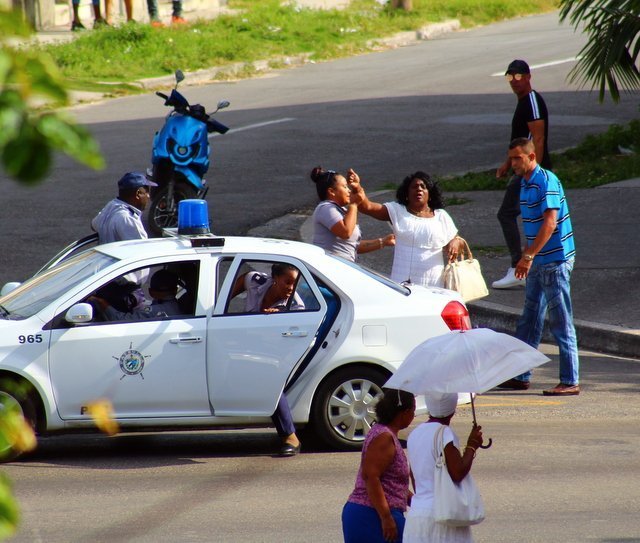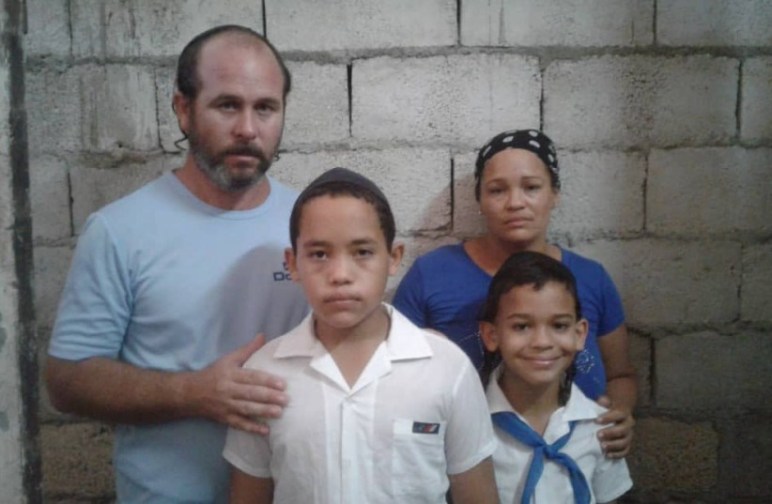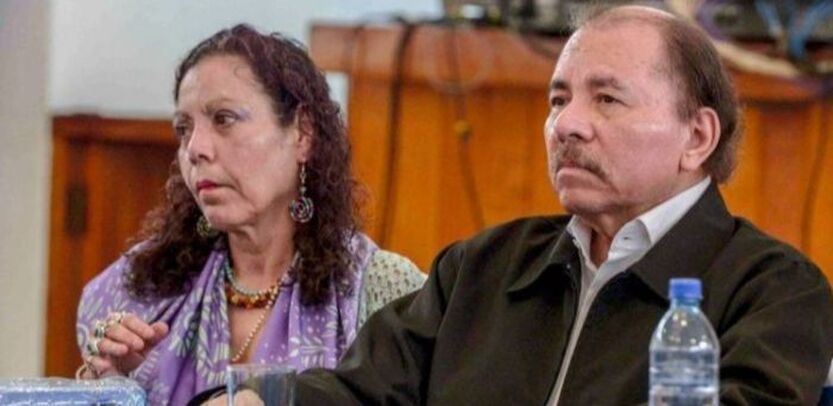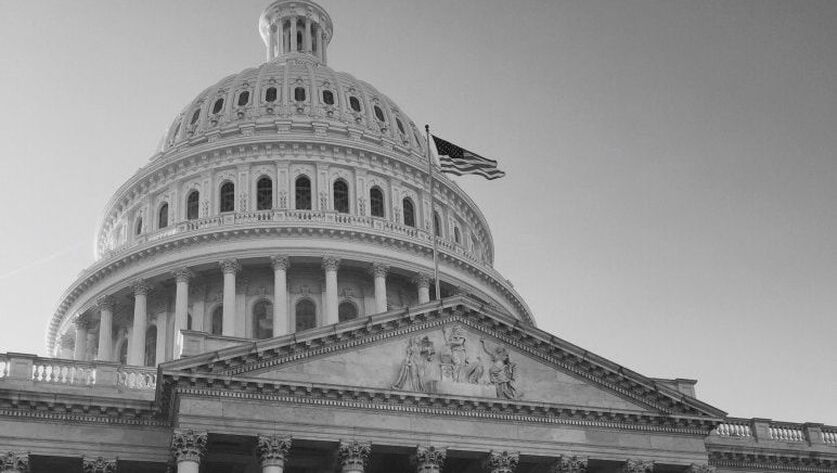by Veronica Mayer
Washington, D.C.) On Friday, February 14, the Inter-American Commission on Human Rights of the Organization of American States advised the Global Liberty Alliance that it has granted Precautionary Measures in support of several members of a Cuban political opposition party, the Patriotic Union of Cuba better known by its Spanish acronym, UNPACU. These are: Jose Daniel Ferrer, UNPACU President, Fernando Gonzalez Valliant, and Jose Pupo Chaveco y Roilan.
THE GLOBAL LIBERTY ALLIANCE DEFENDS JEWISH FAMILY IN CUBA FROM THE REGIME’S ANTI-SEMITIC ATTACKS1/2/2020
The Cuban regime is one of the worst offenders of religious liberty in the Western Hemisphere. Two months ago, the Global Liberty Alliance (GLA) received disturbing reports about a series of anti-Semitic attacks against a Sephardic Jewish family in Camagüey, Cuba. After Havana, Camagüey is Cuba’s third-largest city and is located in the central part of the island.
Working with independent lawyers in lawyers, in December 2019 the GLA started supporting and advising the Tejada family. Based on preliminary reports from the independent lawyers and the family, it appears that what started as an apparent schoolyard bullying incident over the kippah, may have been part of a coordinated intimidation anti-semitic campaign. The matter took on a more serious tone a few weeks ago when a Rapid Response Brigade appears to have been mobilized against the parents. At this juncture, Mr. Olainis Tejeda Beltrán’s eldest son, Liusdán Martínez Lescaille, has been instructed by Cuba’s Ministry of Education that he must stop wearing a kippah to school. If the Tejada family fails to comply with the government’s latest orders, Liusdán’s parents have been told by Communist Party apparatchiks that they could face fines and prison times. This case is similar to the pattern of attack used against the Rigal family in Guantanamo. Christians, the parents are currently in prison for homeschooling their children. You can learn more about the Rigal matter here and here. “Religious liberty is incompatible with socialist thinking. The regime’s puppet lawyers and officials use legal technicalities and regulations to repress religious liberty. Mr. Tejeda and his family are being put through the system to teach them a lesson; however, independent lawyers and civil society leaders have, and will, come to their defense. We will have their backs,” said Jason Poblete, GLA Chief Counsel. The GLA has been in contact with U.S. government officials and policymakers about the Tejada matter along with other religious persecution cases. In the near future, the GLA will release more details about how Cuba’s religious police – the Office of Religious Affairs – is supporting Communist Party efforts to repressing religious freedom on the island. We will also provide an update on the Tejada matter. In the meantime, you can learn more about the Tejada’s case by reading this story in the Jerusalem Post. (Alexandria, Virginia) Yesterday Global Liberty Alliance Chief Counsel Jason Poblete met with officials with one of the leading human rights lawyer groups in Nicaragua, the Permanent Commission of Human Rights, better known by its Spanish acronym, the CPDH.
CPDH Director Marcos Carmona, Esq. and CPDH Executive Director Denis Darce, Esq. are in Washington, D.C. this week to meet with fellow lawyers and human rights defenders to raise awareness about the ongoing crisis in Nicaragua. Earlier this year representatives with Nicaragua’s other leading legal human rights defenders in Nicaragua, the Nicaraguan Pro-Human Rights Association, better known by its Spanish acronym ANPDH, visited with the Global Liberty Alliance in Alexandria, Virginia to discuss similar concerns.
In response to a request from Cuban civil society and religious leaders a few weeks ago, the Global Liberty Alliance sent a letter of information to ICT industry leaders and U.S. policymakers to raise awareness about alleged weaponization of ICT tools in Cuba. The matter was brought to the Global Liberty Alliance’s attention by a human rights defender and former political prisoner, Mr. Jorge Luis García Pérez (known as “Antúnez”).
In his letter to the Global Liberty Alliance, Antúnez said “social networks, a supposedly independent means that protects the identity and dignity of the people,” are being used by the Cuban government to target them. “Thank you for your interest in the liberty of my country and the defense of the fundamental rights of my people,” Antúnez added. In the letter to ICT executives and U.S. policymakers Global Liberty Alliance Chief Counsel Jason Poblete said as their and other ICT companies “work to provide ICT goods and services to Cuba, it is important to factor in your compliance programs that Cuba remains a totalitarian police state. In spite of U.S. efforts to normalize relations with Cuba in 2014, Cuba is an island gulag, not a Caribbean paradise.” You can read Antúnez’s letter here: 2019-04-10 Cuba ICT Letter by Global Liberty Alliance on Scribd
ABOUT ANTÚNEZ
Mr. Pérez (a.k.a., “Antúnez”) has been an active member of the Cuban opposition movement for decades. In March 1990, he was sentenced to five years in prison for publicly denouncing the Castro regime, a sentence that was later extended because of his opposition and refusal to submit to the will of his captors. In 2007, after 17 years in the Cuban prison system, Antúnez was finally released and now leads the Orlando Zapata Tamayo National Resistance Front.
Interviews : Jorge Luis Garcia Perez AntúnezFor more information on Antúnez’s story see more of his interviews published as a part of The Freedom Collection, productions by the George W. Bush Presidential Center, here.
LA PRENSA: RÉGIMEN DE DANIEL ORTEGA Y ROSARIO MURILLO BAJO CRÍTICA EN EL SENADO ESTADOUNIDENSE9/27/2018
En agenda de esta comisión está el debate y votación de la Ley de Derechos Humanos y Anticorrupción de Nicaragua, S. 3233, presentada por el líder demócrata en ese Comité, Bob (Robert) Menéndez. Este miércoles inicia el camino legislativo para la aprobación de iniciativas de Ley de sanciones contra el régimen del dictador Daniel Ortega como respuesta a las graves y sistemáticas violaciones a los derechos humanos, la corrupción y la falta de democracia en Nicaragua. El Comité de Relaciones Exteriores del Senado debatirá el tema. En agenda de esta comisión está el debate y votación de la Ley de Derechos Humanos y Anticorrupción de Nicaragua, S. 3233, presentada por el líder demócrata en ese Comité, Bob (Robert) Menéndez. Se espera que el resultado que saldrá este miércoles de ese Comité es la fusión de su iniciativa —que establece sanciones a personas responsables de violencia y abusos a los derechos humanos—, y la conocida Nica Act cuya autora es la congresista republicana Ileana Ros-Lehtinen. La discusión legislativa surge en momentos que Estados Unidos y la comunidad internacional aumentan la presión contra Ortega, quien se rehúsa a detener la violencia contra manifestantes pacíficos que demandan su salida del poder. Pero también rechaza las elecciones anticipadas. La congresista Ros-Lehtinen dijo el lunes pasado que el resultado sería una “ley fuerte para los abusadores de derechos humanos”. Abanico de sancionesEl exasesor en la Cámara de Representantes, Jason Poblete, explicó que la unión de los proyectos legislativos contempla sanciones a individuos (el del senador Menéndez) y comprensivas (Nica Act) que estarían dirigidas a “sectores de la economía que le dan apoyo al sistema”, esto sería en referencia a organismos multilaterales. En esa misma línea se contempla la limitación del acceso al mercado estadounidense. En el caso de Nicaragua, el Nica Act condicionaría el acceso a los créditos al régimen de Ortega, para evitar el mal uso de los fondos crediticios de la banca internacional, afirmó Ros-Lehtinen el pasado lunes. Poblete dijo que se ha llegado al punto de promover sanciones contra el Gobierno de Nicaragua, porque representa una amenaza a los intereses del hemisferio, a la seguridad y la estabilidad de la región. “Lo que está sucediendo en Nicaragua ya no solo afecta al país. Es una situación que se ha desbordado porque hay una crisis potencial migratoria. Hay una crisis humanitaria”, indicó. Lo anterior es para el experto un campo fértil para la migración ilegal, el crimen organizado y el narcotráfico. “Creo debe haber una respuesta regional, Estados Unidos está dando apoyo y trabajando con nuestros aliados de otros países en Centroamérica para contener el problema y crear estabilidad en Nicaragua”. “La corrupción ha penetrado el sistema en Nicaragua. Está contribuyendo a la permanencia del sandinismo en el poder. Este proyecto de Ley lo que está haciendo es la mezcla de ciertas propuestas de consenso enfocada en la defensa de los derechos humanos, pero también llegar a una solución negociada a la crisis de ser posible”. Según informes de organismos de derechos humanos, la represión de Ortega ha causado entre 322 y 512 muertos. La visión del gobiernoLa dictadura de Daniel Ortega y Rosario Murillo ha defendido que ellos han sido víctimas de un intento de golpe de Estado en los hechos ocurridos a partir de abril.
Sin embargo, en realidad, lo que ocurrió fue una rebelión cívica que fue brutalmente reprimida por el Gobierno, a través de la Policía Orteguista y los paramilitares que aterrorizaban a los ciudadanos en sus barrios. La represión, además de muertes, ha provocado el éxodo de miles de personas en busca de su bienestar y ante la amenaza reiterada del partido Frente Sandinista de Liberación Nacional que opera en los barrios a través de los Consejos del Poder Ciudadanos, órganos de control civil de Ortega. According to a story in McClatchy News, Trump administration officials recently met with Venezuelan opposition members “to urge the White House to sanction Nicaragua and a company whose joint venture they say is helping to prop up the government in Caracas, according to multiple sources familiar with the conversations.” Read more here. If Venezuelan opposition leaders are pressing Trump administration officials to sanction Nicaragua, it marks the first time that Daniel Ortega has come under recent public scrutiny for meddling in politics outside of Nicaragua. Recent reports in Nicaraguan newspapers quote opposition leaders and local experts alleging that Nicaragua has been hiding money for the state-owned Venezuelan energy company PDVSA. The issues in Nicaragua appear to stem from transactions involving Nicaraguan company partially owned by the Venezuelan government called ALBANISA S.A. According to one expert, close to $4.0 billion may have been held or laundered through that Venezuelan-owned company. Was the company set up, or used, to evade U.S. economic sanctions? Is there a Cuba or Russia connection? The U.S. government has many tools at its disposal to address public corruption in countries such as Nicaragua, including economic sanctions, the Global Magnitsky Act, and other laws. The Congress is also considering the Nicaraguan Investment Conditionality Act (NICA) of 2017. Among other things, the NICA directs the President to instruct the U.S. Executive Director at international financial institution (IFIs) to use U.S. influence to oppose any loan for the government of Nicaragua’s benefit if various conditions are not met to help advance rule of law and curb human rights abuses, among other conditions. To learn more about the Fund’s work in Nicaragua, follow this link to read about a political persecution case by the Sandinistas of an American businessman, Mr. Roberto Bendaña McEwan. Roberto was falsely accused by Nicaragua’s Sandinista government of various crimes because he dared to call for free and transparent elections in Nicaragua including a clean up of the voter rolls in that country.
On or about January 2, 2014, Nicaragua abused the INTERPOL processes by requesting a Red Notice based on false charges. An INTERPOL Red Notice is a device that alerts law enforcement agencies around the world of an outstanding arrest warrant. You can read more about Roberto case by following this link. 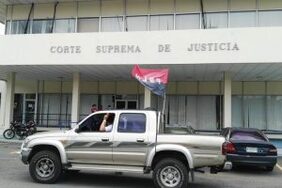 One of the oldest newspaper in Nicaragua, La Prensa, highlighted the efforts by The Global Rule of Law & Liberty Legal Defense Fund in an editorial on entrepreneur and civil society advocate Roberto Bendaña McEwan. The article discusses the human rights violations, institutional backsliding in Nicaragua, and the unlawful use of the judicial system and international bodies such as INTERPOL to repress critics of the dictatorial regime. Jason Poblete, co-founder, the Fund discussed the matter with La Prensa, stating that the abuse of the judicial system and lack of due process in Nicaragua are matters of interest to the United States, because you can’t have successful relations with a country that doesn’t comply with international laws. The video produced by Global Liberty Defense was shown to U.S. officials in the Congress with the purpose of educating them on the politics in Latin America, focusing on Mr. Bendaña’s story. Earlier this month, a revised version of the Nicaraguan Investment Conditionality Act of 2017 (“NICA” Act) was re-introduced in the House, which toughens the proposal of conditions on loans from multilateral organizations to the Ortega regime, and holds the regime accountable for fraudulent elections, corruption and human rights abuses. Representatives Ileana Ros-Lehtinen (R-FL) and Albio Sires (D-NJ) made the following statements after re-introducing the NICA Act; Statement by Ros-Lehtinen: “We must continue to hold all governments within Central America to similar standards when it comes to human rights, corruption, and transparency as we examine where to best use U.S. taxpayer dollars and the Ortega regime in Nicaragua is no exception. This version of the NICA Act goes one step further than the previous version Albio and I introduced last Congress by calling for the Ortega regime to actively combat corruption and take significant steps to protect human rights defenders and activists. These are bipartisan concerns, and as many of us have witnessed for over a decade, Ortega’s power grab has brought Nicaragua into a continuous downward spiral. The time to take action is now – for the people of Nicaragua and for their democratic future – before it is too late. The NICA Act will be a powerful tool that can help end the atrocities occurring in Nicaragua and reverse its current destructive trajectory.” The original article by La Prensa (in Spanish) can be found here.
OTHER RESOURCES:
On March 9, Florida Congresswoman Ileana Ros-Lehtinen released the following statement on the 10 year anniversary of Robert Levinson’s disappearance in Iran. Rep. Ros-Lehtinen’s statement points out Iran’s “disturbing pattern” of taking American and dual citizens hostage, including Internet freedom advocate Nizar Zakka. The press release, found below, can also be found here. Ros-Lehtinen Statement on the 10 Year Anniversary of Robert Levinson’s Disappearance in IranMar 9, 2017
Ros-Lehtinen Statement on the 10 Year Anniversary of Robert Levinson’s Disappearance in Iran “Iran must honor its commitments and we must not give up the fight until Bob is home with his family”(Washington, DC) – U.S. Rep. Ileana Ros-Lehtinen (R – FL), Chairman of the Subcommittee on the Middle East and North Africa, made the following statement on the 10th anniversary of the disappearance of South Florida resident, Robert Levinson, in Iran on March 9, 2007. At 3,652 days, Levinson is the longest held American hostage in our nation’s history. Rep. Ros-Lehtinen once again joined Rep. Ted Deutch (D-FL), Ranking Member of the Subcommittee on the Middle East and North Africa, in introducing a Resolution, H.Res. 185, urging the Government of Iran to fulfill its promises of assistance in the case of Robert Levinson and calling for his unconditional release. Statement by Ros-Lehtinen: “Ten years have passed since Bob disappeared in Iran, and despite numerous assurances and constant pressure, the Iranian regime has yet to release information on Bob and has failed to help bring him home to his wife, Christine, and their seven children. This is unconscionable. Iran must honor its commitments and we must not give up the fight until Bob is home with his family. “But we must also recognize that the Levinson case is not isolated. Iran has a disturbing pattern of holding American citizens hostage. This includes dual U.S.-Iranian citizens, like Baquer and Siamak Namazi, who have been unjustly held hostage by Iran since October 2015, and Nizar Zakka, a U.S. permanent legal resident who has been held by the regime since September 2015. We must not allow Iran to continue to target Americans to use as leverage for ransom payments. Iran must release unconditionally all American citizens and permanent legal residents. Roberto Bendaña McEwan, a U.S. citizen, is a successful businessman who was born and raised in Nicaragua. He has led and been involved in numerous civil society groups promoting active participation in national politics. In September 2013, Bendaña was wrongfully charged by the Nicaraguan government and denied a fair trial. Nicaragua later requested an INTERPOL Red Notice for his arrest. This is his story. Video References:
|
NewsCategories
All
|
-
About Us
- Working Groups
-
Featured Case Work
- The Cadet Newspaper at VMI
- Free Yorubas of Cuba, Regularly Attacked for Faith
- Alina Lopez-Miyares, US Citizen Tried by Cuban Tribunal
- Jamshid Sharmahd, Businessman and Broadcaster Kidnapped into Iran
- Roberto Quiñones, Jailed for Journalism
- José Daniel Ferrer and UNPACU Activists
- Rigal-Expósito Family, Torn Apart for Homeschooling
- Tejeda-Lescaille Family, Persecuted for Jewish Faith
- The Whittaker Chambers Farm
- Past Cases >
- News & Media
- Donations
- Tips

